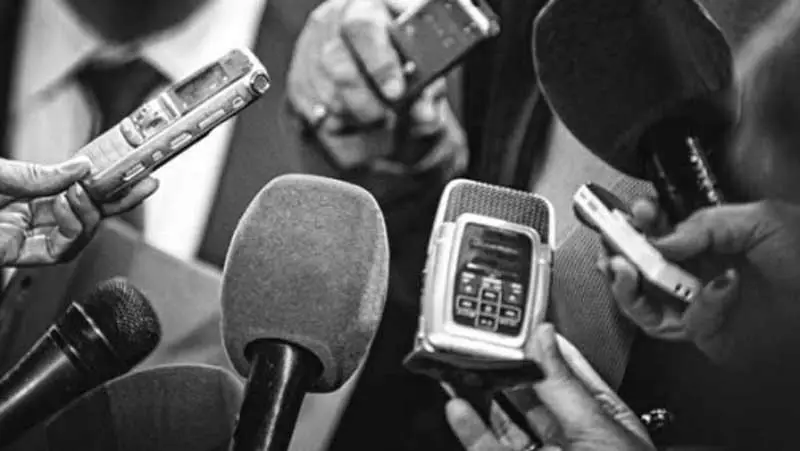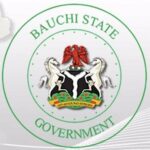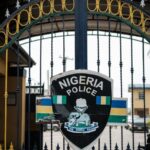By John C. Azu (Abuja), Peter Moses (Abeokuta), Bassey Willie (Yenagoa), Haruna G. Yaya (Gombe) & Christiana T. Alabi (Lagos)
Journalists in Nigeria on Tuesday bemoaned their worsening working conditions as they joined their counterparts across the globe to mark this year’s World Press Freedom Day themed ‘Journalism under Digital Siege’.
They expressed worry that the space for freedom of expression had been constricted in the country, especially with cases of harassment, arrest and detention of journalists.
Tortuous journey before security agencies ahead of 2023 elections
Omo-Agege appoints Niboro campaign communications director
President, Nigerian Union of Journalists (NUJ), Chris Isiguzo who spoke to Daily Trust yesterday, expressed regret over emerging threats facing journalists in the digital environment.
He urged the federal government to respect its commitment and uphold the right to freedom of expression as enshrined in Article 19 of the Universal Declaration of Human Rights and the African Charter on Peoples and Human Rights. Isiguzo said a good number of journalists had become victims of surveillance, spying, harassment, threats, violence, assaults and arbitrary arrests, among others.
He said it had, therefore, become imperative for stakeholders to come together to fashion out the best possible ways of addressing these challenges.
He said: “The media remains the oxygen of democracy. Therefore, for the nation’s democracy to remain functional, responsible and responsive journalists must be allowed to operate in an environment devoid of persistent clampdowns.”
The President of the International Press Institute (IPI) Nigeria and Editor-in-Chief of Premium Times, Musikilu Mojeed, told Daily Trust yesterday that the Nigerian authorities had put journalists under telephone surveillance, in addition to harassing them.
He said the situation could worsen ahead of the 2023 general elections.
Mojeed said: “There are a lot of challenges facing the average Nigerian journalist from the effects of the poor economy, which doesn’t take the media into consideration at all, impoverishing a lot of media organisations and making them unable to invest in news production and even pay their staff members.
“Added to that is the threat from the government and its officials. From time to time, journalists are routinely harassed, they are incarcerated and at times state governors would abduct journalists.”
He recalled the army’s invasion of the Abuja and Maiduguri offices of Daily Trust and the recent summon of its two reporters by the police over a report that “actually provided intelligence for the police.”
The Media Rights Agenda (MRA) flayed the government and security agencies’ targeted communication surveillance, which it said, ought to be carried out within the “Framework of a law that conforms with international human rights laws and standards upon a specific and reasonable suspicion that a serious crime has been or is being carried out and after the prior authorisation of an independent judicial authority has been obtained.”
In a statement through its Communications Officer, Idowu Adewale, the MRA said Nigeria’s acquisition of surveillance technologies in recent years was having a significant negative impact on media freedom and freedom of expression, the safety of journalists, access to information and the right to privacy, thereby putting the rights at risk.
It said: “Human safety and security, as well as respect for human rights and fundamental freedom, should underpin any national cybersecurity effort. There can be no justification for the indiscriminate interception, monitoring or surveillance of people’s private communication, which leave innocent citizens fearful for their safety and of their government.”
In its latest report released on April 26, the US Department of State accused Nigerian authorities of increasingly targeting journalists and online critics.
In its annual Country Report on Human Rights Practices unveiled by the Secretary of State, Antony Blinken, the US cited the growing criminalisation of defamation and citing of individuals for blasphemy or incitement in Kano such as Sheikh Abduljabbar Nasiru-Kabara, Mubarak Bala and Omar Farouq as well as the restriction of media organisations to cover the trial of the leader of the Indigenous People of Biafra (IPOB), Nnamdi Kanu, at the Federal High Court, Abuja.
The report also cited some incidents of 2021, including the April 30 arrest of Peoples Daily’s correspondent, Sunday Ode, on the alleged order of Governor Samuel Ortom of Benue State; the May 30 arrest and detention of six newspaper vendors in Owerri, Imo State, for selling papers on IPOB’s activities; the June 29 killing of Naija FM presenter, Titus Badejo in Ibadan, Oyo State; the assault by the police on The Punch’s correspondent, Friday Olokor and the seizure of the cell phone of Patience Ihejika of Leadership.
The report also cited the alleged government’s control and censorship of the media through the National Broadcasting Commission (NBC) and the ban of Twitter for one year after President Muhammadu Buhari’s post was flagged for violating the “abusive behaviour” rules.
Statistics from the European Union (EU) and the Committee to Protect Journalists (CPJ) showed that from 2021 to April 2022, a total of 71 journalists were killed across the world.
The EU, during the International Day to End the Impunity for Crimes Against Journalists last November, had announced that 44 journalists were killed globally.
The CPJ said 27 journalists and media workers had so far been killed this year. Among the victims was a reporter with the Vanguard, Tordue Salem, who was killed in Abuja in October 2021.
EU Delegation Representative, Wynyfred Egbuson, had also said that since last year, many more journalists had been attacked, “Unlawfully imprisoned or missing, leaving their families awaiting news of their faith, sometimes for years.”
The CPJ also said 293 journalists were jailed globally in 2021 three of whom are Nigerians: Agba Jalingo (Cross River State); Fredrick Nnaji and Chigozie Nwafor (Enugu) and Luka Binniyat (Kaduna).
Threat to media freedom real in Nigeria–NGE
Meanwhile, the Nigerian Guild of Editors (NGE) has described the threat to media freedom in Nigeria as real and that its impact on democracy will be dangerous if not checked.
In a statement to mark the 2022 World Press Freedom Day, NGE President Mustapha Isa and General Secretary Iyobosa Uwugiaren said the government and media professionals needed to reflect on issues of press freedom and professional ethics.
They stated: “There is an urgent need to protect the media because the impact of the suffocating economic and political environment being created by the government will be very dangerous to our democracy. A threat to the media is a threat to our democracy.
“Government at all levels must take the lead in making sure that its actions do not inspire violations of press freedom. A democratic society like Nigeria should know that it has a crucial role to play in maintaining media freedom and facilitating access to public information.
“Government should regularly take strong and immediate action against any violations of media freedom – this should include speaking out against violence against journalists and authorities’ failure/refusal to identify and prosecute attackers.’’
Jonathan Foundation wants journalists protected from attacks
The Goodluck Jonathan Foundation yesterday urged government at all levels and citizens to defend journalism and journalists from attacks in order to guarantee press freedom in Nigeria.
The Communications Officer of the Foundation, Wealth Dickson Ominabo, in a statement, noted that despite the obvious benefits associated with digital technology, it had exposed citizens to new forms of tyranny and violence.
He, therefore, called on stakeholders to defend journalists from all forms of repression.
He also urged media practitioners to uphold ethics in the discharge of their duties.
Gombe, Ogun, Lagos govs caution journalists against fake news
Gombe State Governor, Muhammadu Inuwa Yahaya yesterday advised journalists to guard against fake news and misinformation and ensure accurate and balanced reportage of events and activities in the state.
He said despite obvious challenges and risks faced by journalists, “They must continue to remain steadfast and avoid being used as tools in the hands of desperate politicians and mischief makers to cause distress and disrupt the peaceful atmosphere in the state.”
Similarly, Ogun State Governor, Dapo Abiodun yesterday asked Nigerian journalists not to derail from performing their constitutional and social responsibilities and to ensure accurate and objective reportage.
He charged them to tackle the issue of fake news “and abstain from propaganda capable of truncating the security and peace in the country.”
Also, Lagos State Governor, Babajide Sanwo-Olu yesterday encouraged journalists to rededicate themselves to courageous and objective journalism.
He noted that the emergence of fake news, especially its dominance on digital and social media, had challenged the reputation of the profession as the channel of credible information.
Sanwo-Olu in a statement by the Commissioner for Information and Strategy, Gbenga Omotoso, urged policymakers, journalists, media personnel, lawmakers, internet experts and other stakeholders to dialogue on ways of ensuring that the profession remains for all a beacon of hope and integrity.

 Join Daily Trust WhatsApp Community For Quick Access To News and Happenings Around You.
Join Daily Trust WhatsApp Community For Quick Access To News and Happenings Around You.


